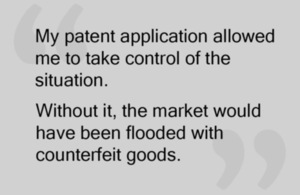Intellectual Property: Sashmate ®
While working for the family business, Daniel Cheddie realised the need for a tool to help solo operators fit or repair double glazed windows.

Quote by Daniel Cheddie, inventor of Sashmate
Daniel explains:
As there were just two of us, we were often faced with a dilemma. If we both went out on a job, there wasn’t anybody left to run the business and deal with customers. If one of us went out on our own, we would find it difficult or impossible to remove a double-glazed sash, typically weighing up to 30kg.
The Intellectual Property (IP)
Recognising a gap in the market, Daniel had the idea for a device that would allow a single fitter to clamp and remove the sash, safely and easily. One of Daniel’s first steps was to protect the idea by filing for patent protection and working closely with his patent attorney he secured UK and international patent protection, along with a number of trade mark registrations.
The results
Armed with a prototype of his device, Daniel took a stand at a major retail exhibition and the reaction was tremendous. As sales increased manufacturing was transferred to China, and things were going well, until out of the blue one of his customers returned one of the tools as it had missing parts and no instructions. Daniel realised straight away that the product was an inferior copy not supplied by his company.
After some detective work by his patent attorney, the origination of the fake device was established and the wholesaler and supplier of the counterfeit product were contacted and informed of their wrong doing. The offending company immediately acknowledged they were infringing Daniels IP rights, agreed to stop selling the offending product and offered to pay compensation.
Daniel confirmed:
my patent application allowed me to take control of the situation, without it, the market could have been flooded with counterfeit products.
He has now developed a range of tools to further increase safety and efficiency for professional carrying out repairs as well as bringing back manufacture to the UK where the products will now be made in a superior zinc plated steel.
Lessons learned
Counterfeit products are always a concern, especially when products are manufactured overseas. Adequate international IP protection is invaluable if you’re thinking of making or selling your products abroad. As Daniel noted:
my patent application allowed me to take control of the situation, without it, the market could have been flooded with counterfeit products.